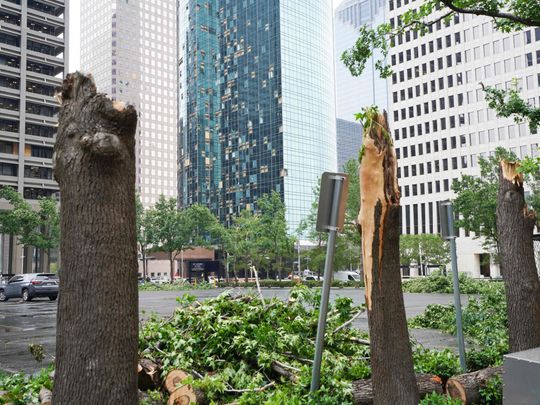
Washington: Tornado-spawning thunderstorms that swept the US Southern Plains and Ozarks have killed at least 19 people as of Monday morning across four states and wrecked hundreds of buildings, with forecasters warning of more severe weather.
The death toll known thus far from the severe weather over the Memorial Day weekend includes at least eight fatalities in Arkansas, seven in Texas, two in Kentucky and two in Oklahoma, according to tallies by emergency authorities in these states.
Kentucky governor Andy Beshear declared a state of emergency in his state early on Monday while the National Weather Service said a severe thunderstorm watch was issued for parts of Georgia and South Carolina until at least Monday afternoon.
The two known deaths in Kentucky occurred after trees fell on homes in Mercer County and Louisville. “It was a tough night for our people,” Beshear said in a post on X.
At least seven people perished - including two children aged 2 and 5 from a single family - and nearly 100 were injured on Saturday night when a powerful tornado struck communities in north Texas near the Oklahoma border, Governor Greg Abbott said at a news conference on Sunday.
Late on Sunday, Arkansas Governor Sarah Sanders said the state had at least eight deaths after the storms. A resident in Arkansas suffering from chronic obstructive pulmonary disease died due to lack of oxygen when the power went out.
Hundreds of thousands of Americans also faced power outages on Monday as a result of the weather, according to PowerOutage.US tracking website, with Kentucky alone having over 180,000 outages.
The Weather Service warned of additional storms moving through the Ohio and Tennessee valleys, bringing a mix of damaging winds, large hail and more tornadoes, as well as heavy downpours capable of triggering flash floods.
The latest bout of extreme weather came just days after a powerful tornado ripped through a rural Iowa town, killing four people, and more twisters touched down in Texas last week.
Meanwhile, the US was preparing for what government forecasters have called a potentially “extraordinary” 2024 Atlantic hurricane season beginning June 1.












